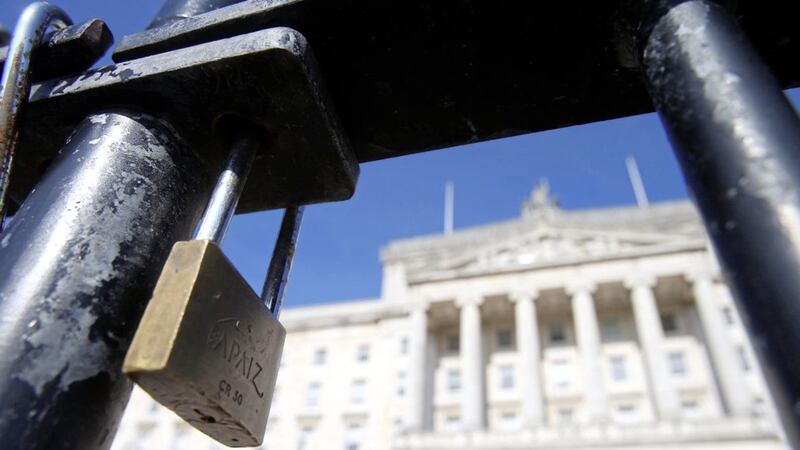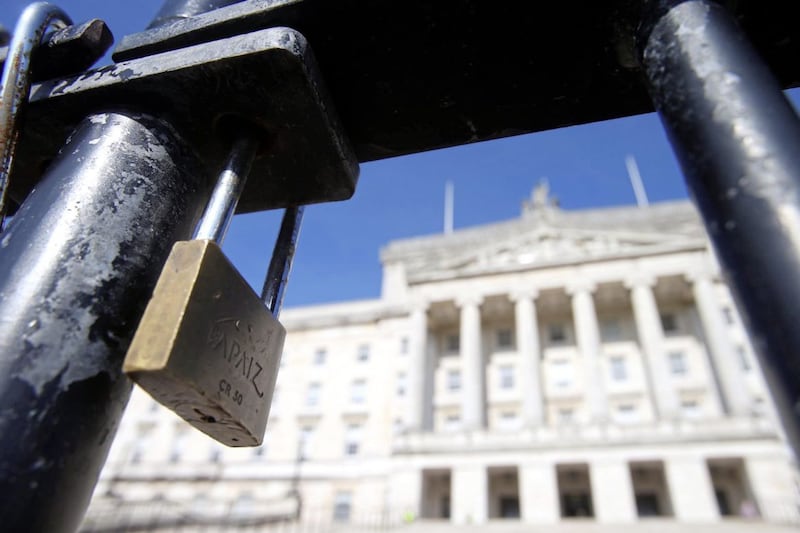Watching grass grow would be a heart-stopping experience compared to the stalemate that has
passed for politics over the last eight months and more in the north.
Journalists like to fantasise about being a fly on the wall in any set of negotiations, but after all this time even that poor creature would have fallen into a stony sleep.
One theory as to why the talks have been so protracted is that, although the issues involved are quite important and rather urgent, they just aren’t important and urgent enough. It’s not like the old days when action was required to maintain ceasefires and secure the release of prisoners serving lengthy jail-terms, for example.
Without downplaying the need to enhance the status of the Irish language – a cause to which I have devoted many years of my own life – along with the necessity for allowing marriage on the basis of love rather than sexual orientation, these are not usually seen as matters of life and death.
The fact that they have become stumbling-blocks is rather bizarre. Like other republican or nationalist parties, Sinn Féin has its share of Irish-language enthusiasts, including Gerry Adams himself, but their proportion is not significantly higher than in, say, Fianna Fáil or the SDLP. If I go to the annual conference or ard fheis of any of these three parties, roughly the same number of people will greet me in the sweet and kingly tongue of the Gael and we will carry on, despite knowing no-one around us understands.
Nor has it ever appeared down through the years that gay rights were a core make-or-break issue for militant republicans. It was the Irish Labour Party under Eamon Gilmore who led the way towards the legalisation of same-sex marriage by way of a constitutional referendum in the south. That was an historic development although Labour got no payback and many of its TDs were ousted in the subsequent general election.
It is difficult to ward off the suspicion that the real reason for the talks breakdown on the republican side of the table must lie elsewhere. Going back into the executive would probably involve cuts of one kind or another and these would be used as anti-Sinn Féin propaganda by the party’s opponents in the next general election in the south, which could in theory take place as early as this coming spring. The jibe that, “You are against cuts down here but your ministers are implementing them in the north”, has been deployed in the past.
Attaching the tag of double-standards and political hypocrisy to Sinn Féin candidates could affect the number of Dáil seats the party comes home with when the votes are counted. At the same time, the lack of movement in the Stormont negotiations has damaged Sinn Féin’s image in the south. Politicians are meant to get things done, not spend their time staring across a table at their political opponents and repeating the same demands over and over.
There doesn’t seem to have been a lot of give on the unionist side either. It really is time for the Democratic Unionist Party to get the message through to all its members that it’s time to wake up and smell the coffee – or maybe the Ulster fry. The sky won’t fall in if a minority language is given a modicum of extra recognition. And the institution of marriage won’t be significantly weakened by allowing it to take place on a same-sex basis: some would argue that it might even gain strength.
Time was when the north was considerably more liberal than the south on a whole range of issues like birth control and divorce, as well as book and film censorship. People would cross the border to see banned films and buy condoms or a John McGahern novel the Dublin censors had rejected. Now it’s the south that sometimes resembles a liberal haven while the north seems to be dragging its feet.
We are just over five months away from the 20th anniversary of the Good Friday Agreement. There have been moments since, when the bright hopes aroused by the GFA seemed to have been realised. One recalls the day in May 2007 when the “Chuckle Brothers”, Ian Paisley and Martin McGuinness made their way onto the stage, with the likes of Edward Kennedy and his sister Jean Kennedy Smith, Tony Blair, Bertie Ahern and Albert Reynolds looking on. The highlight was the performance by special-needs group The Sky’s the Limit, who mimed that inspiring number, “You Raise Me Up”.
Underlying it all was the desire to bring closure to an era in which almost 4,000 people had died in Troubles-related violence. We are not about to return to that horrific scenario anytime soon, but you can never take anything for granted.
@ddebreadun








